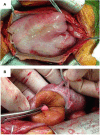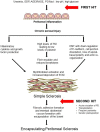Encapsulating peritoneal sclerosis-a rare but devastating peritoneal disease
- PMID: 25601836
- PMCID: PMC4283512
- DOI: 10.3389/fphys.2014.00470
Encapsulating peritoneal sclerosis-a rare but devastating peritoneal disease
Abstract
Encapsulating peritoneal sclerosis (EPS) is a devastating but, fortunately, rare complication of long-term peritoneal dialysis. The disease is associated with extensive thickening and fibrosis of the peritoneum resulting in the formation of a fibrous cocoon encapsulating the bowel leading to intestinal obstruction. The incidence of EPS ranges between 0.7 and 3.3% and increases with duration of peritoneal dialysis therapy. Dialysis fluid is hyperosmotic, hyperglycemic, and acidic causing chronic injury and inflammation in the peritoneum with loss of mesothelium and extensive tissue fibrosis. The pathogenesis of EPS, however, still remains uncertain, although a widely accepted hypothesis is the "two-hit theory," where, the first hit is chronic peritoneal membrane injury from long standing peritoneal dialysis followed by a second hit such as an episode of peritonitis, genetic predisposition and/or acute cessation of peritoneal dialysis, leading to EPS. Recently, EPS has been reported in patients shortly after transplantation suggesting that this procedure may also act as a possible second insult. The process of epithelial-mesenchymal transition of mesothelial cells is proposed to play a central role in the development of peritoneal sclerosis, a common characteristic of patients on dialysis, however, its importance in EPS is less clear. There is no established treatment for EPS although evidence from small case studies suggests that corticosteroids and tamoxifen may be beneficial. Nutritional support is essential and surgical intervention (peritonectomy and enterolysis) is recommended in later stages to relieve bowel obstruction.
Keywords: encapsulating peritoneal sclerosis; epithelial–mesenchymal transition; fibrosis; mesothelium; peritoneal dialysis.
Figures


References
-
- Aguilera A., Yáñez-Mo M., Selgas R., Sánchez-Madrid F., López-Cabrera M. (2005). Epithelial to mesenchymal transition as a triggering factor of peritoneal membrane fibrosis and angiogenesis in peritoneal dialysis patients. Curr. Opin. Investig. Drugs 6, 262–268. - PubMed
-
- Aroeira L. S., Aguilera A., Sánchez-Tomero J. A., Bajo M. A., del Peso G., Jiménez-Heffernan J. A., et al. . (2007). Epithelial to mesenchymal transition and peritoneal membrane failure in peritoneal dialysis patients: pathologic significance and potential therapeutic interventions. J. Am. Soc. Nephrol. 18, 2004–2011. 10.1681/ASN.2006111292 - DOI - PubMed
Publication types
LinkOut - more resources
Full Text Sources
Other Literature Sources

